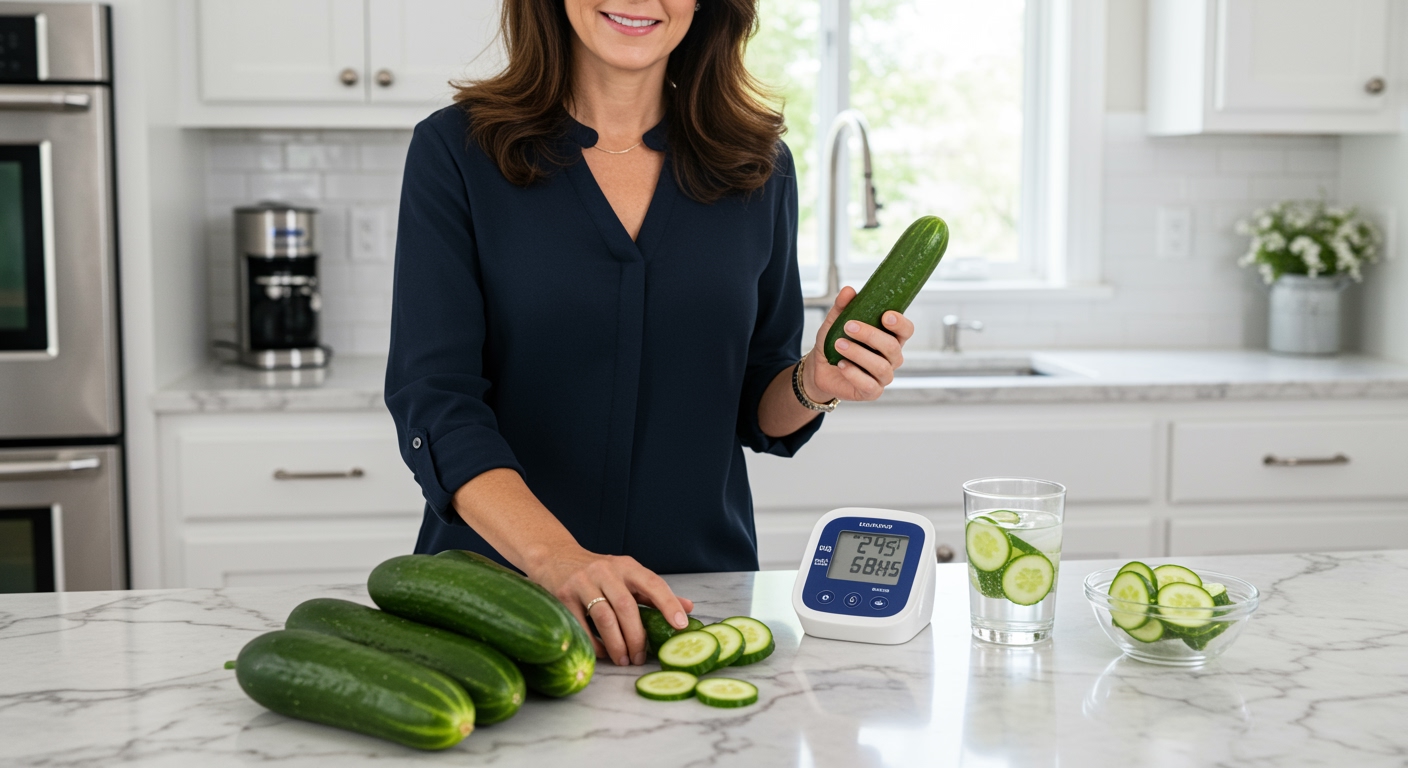✪ Key Takeaway: Cucumbers can help lower blood pressure through potassium content and natural diuretic effects.
Introduction
Your doctor just told you that your blood pressure numbers are creeping up, and now you are wondering if simple foods like cucumbers can make a difference.
You might be asking this question because you want natural ways to support your cardiovascular health without immediately jumping to medications, or perhaps you have heard conflicting information about whether vegetables really impact blood pressure.
Hi, I am Abdur, your nutrition coach, and today I am going to explain exactly how cucumbers affect your blood pressure and whether they deserve a place in your heart-healthy eating plan.
How Do Cucumbers Actually Affect Blood Pressure?
Cucumbers contain several compounds that work together to support healthy blood pressure levels through multiple pathways in your body.
The most important mechanism involves potassium, which cucumbers provide in meaningful amounts at about 147 milligrams per cup of sliced cucumber.
Potassium helps your kidneys remove excess sodium from your bloodstream, which directly reduces the volume of fluid your heart needs to pump.
When sodium levels drop, your blood vessels can relax more easily, creating less resistance against blood flow and naturally lowering pressure readings.
Cucumbers also act as a natural diuretic due to their high water content and specific plant compounds called cucurbitacins.
This diuretic effect helps your body eliminate excess fluids that can contribute to elevated blood pressure, similar to how prescription diuretic medications work but through gentler, natural processes.
✪ Fact: One medium cucumber provides about 10% of your daily potassium needs while containing zero sodium.
What Makes Cucumbers Different From Other Vegetables?
Cucumbers stand out from other vegetables because of their unique combination of high water content and specific bioactive compounds.
While most vegetables contain potassium, cucumbers deliver this mineral alongside 96% water content, which creates a synergistic effect for blood pressure management.
The water helps transport potassium more efficiently to your cells while simultaneously supporting kidney function and fluid balance.
Cucumbers also contain magnesium, another mineral that supports blood vessel relaxation and works alongside potassium to regulate blood pressure.
Unlike starchy vegetables that can cause blood sugar spikes, cucumbers have an extremely low glycemic impact, making them suitable for people with diabetes who often struggle with blood pressure control.
The silica content in cucumber peels supports blood vessel integrity and flexibility, which becomes increasingly important as we age and our arteries naturally become stiffer.
✪ Pro Tip: Eat cucumbers with the peel on to maximize silica and fiber intake for better blood vessel health.
How Much Cucumber Should You Eat For Blood Pressure Benefits?
Research suggests that consuming one to two cups of sliced cucumber daily can provide meaningful blood pressure support when combined with other healthy lifestyle choices.
This amount delivers approximately 150-300 milligrams of potassium, which represents about 6-12% of your daily potassium needs.
The timing of cucumber consumption can also influence its blood pressure effects, with many people finding better results when they eat cucumbers throughout the day rather than all at once.
You can maximize benefits by combining cucumbers with other potassium-rich foods like bananas, spinach, or avocados to create a more comprehensive approach to blood pressure management.
However, cucumbers alone will not dramatically lower severely elevated blood pressure, and they work best as part of an overall heart-healthy eating pattern that limits sodium and processed foods.
People taking blood pressure medications should monitor their levels carefully when increasing cucumber intake, as the combined effects might require medication adjustments under medical supervision.
✪ Note: Always consult your doctor before making significant dietary changes if you take blood pressure medications.
Are There Any Risks Or Side Effects?
Most people can safely eat cucumbers daily without experiencing negative side effects, but there are a few considerations to keep in mind.
Some individuals may experience digestive discomfort from eating large amounts of cucumber, particularly if they consume the seeds and peel together.
The natural diuretic effect of cucumbers might cause increased urination, which could be inconvenient for some people but is generally not harmful.
People with kidney problems should be cautious about dramatically increasing potassium intake from any source, including cucumbers, without medical guidance.
Cucumbers can interact with certain medications, particularly blood thinners, due to their vitamin K content, though the levels are relatively low compared to leafy greens.
If you experience unusual symptoms like excessive thirst, dizziness, or changes in urination patterns after increasing cucumber consumption, you should reduce your intake and consult with a healthcare provider.
✪ Pro Tip: Start with half a cup daily and gradually increase to assess your individual tolerance.
The Bottom Line
Cucumbers can indeed support healthy blood pressure levels through their potassium content, natural diuretic properties, and blood vessel-supporting compounds, making them a valuable addition to a heart-healthy diet.
Small consistent choices create big health changes over time, and adding cucumbers to your daily routine represents exactly this type of simple yet effective strategy.
I would love to hear about your experience with cucumbers and blood pressure management, so please share your questions, success stories, or concerns in the comments below.
References
At NutritionCrown, we use quality and credible sources to ensure our content is accurate and trustworthy. Below are the sources referenced in creating this article:
- HealMed Journal: Nutritional Benefits and Health Effects of Cucumber
- PMC Research: Dietary Potassium and Blood Pressure Management
- Midwifery Journal: Natural Approaches to Hypertension Management





